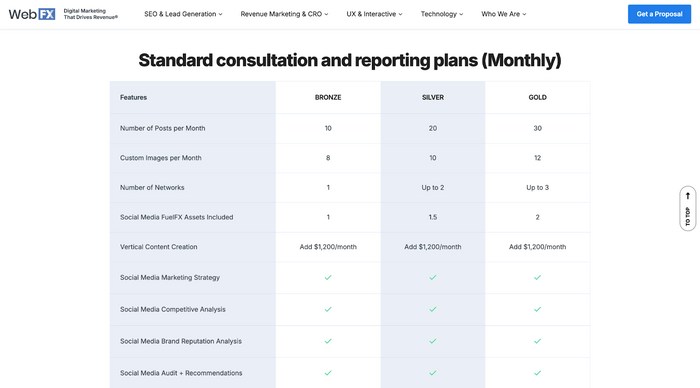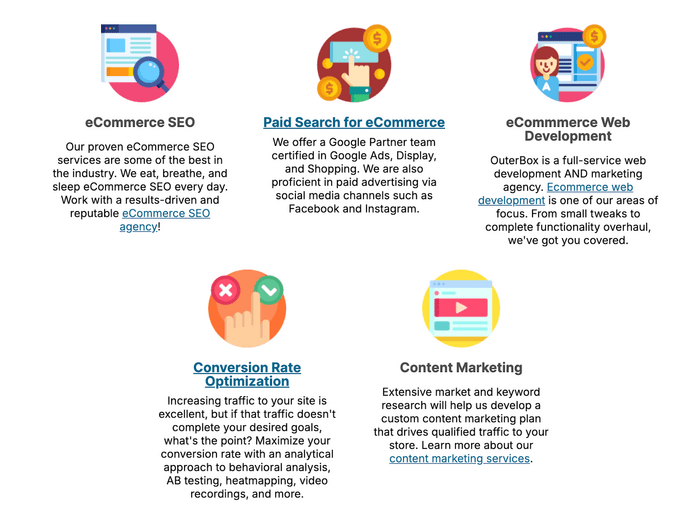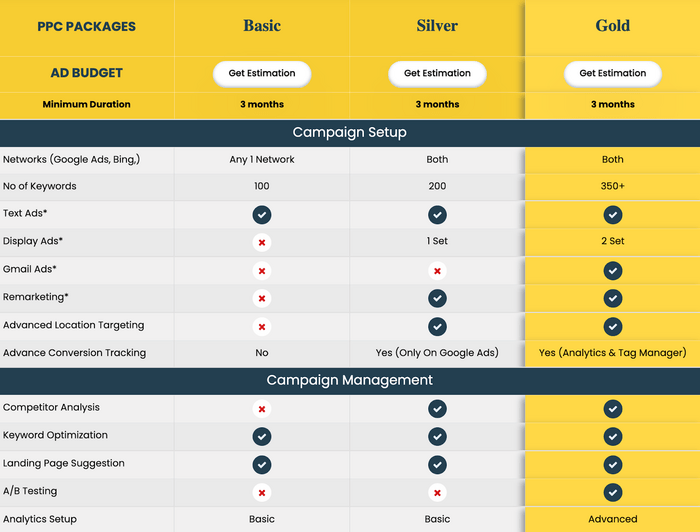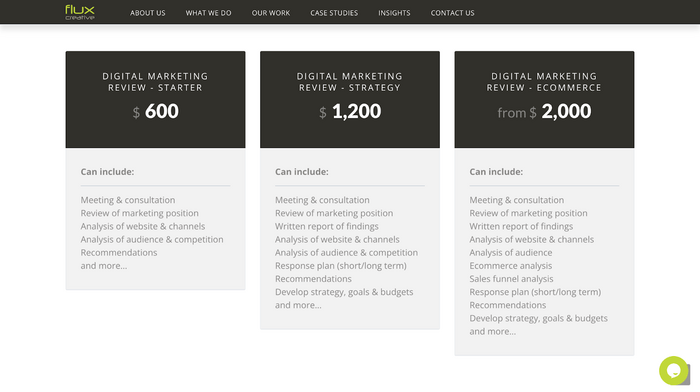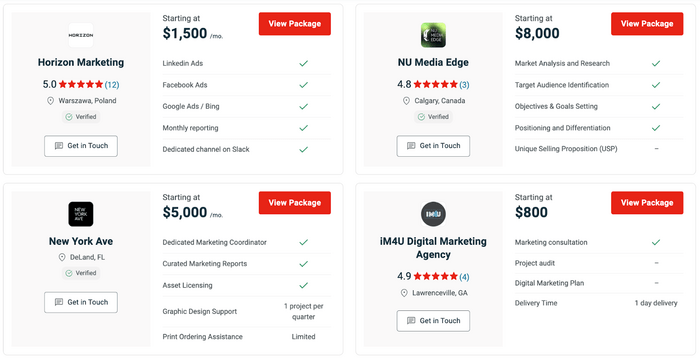Choosing digital marketing packages: what really works (and what doesn’t)

Contents
- What are digital marketing packages?
- Types of digital marketing packages
- How much do digital marketing packages cost?
- How to choose the right digital marketing package
- Step 1: Define your marketing goals
- Step 2: Evaluate what's included
- Step 3: Check provider expertise and track record
- Step 3: Consider flexibility
- Step 4: Set a realistic budget
- Step 5: Prioritize communication
- Step 5: Research provider credibility
- Step 6: Ask about reporting and analytics
- Step 7: Take your time and compare
- Common pitfalls when choosing digital marketing packages
- Questions to ask before buying a digital marketing package
- When should businesses avoid digital marketing packages?
- Comparing DIY marketing versus marketing packages
- Real-life success stories
- Final thoughts
When I started my first online business years ago, I knew little about digital marketing.
I thought creating a nice-looking website would bring customers automatically. Of course, that didn’t happen. Frustrated and losing money fast, I finally turned to digital marketing packages. But like most beginners, I was skeptical. Were they really worth the cost?
Today, after years of trial and error and helping numerous clients build their own online presence, I know that picking the right marketing package can genuinely change your business.
But how do you find the right one? And are these packages really effective?
Let’s talk honestly about what digital marketing packages offer, how to pick the best one for your goals, and learn from real-world examples of businesses thriving because of them.
What are digital marketing packages?
Simply put, digital marketing packages bundle various online marketing services into one convenient plan. Instead of managing SEO, social media, email marketing, and ads separately, you pay one price to a marketing provider that handles everything for you.
These packages usually include:
- SEO (search engine optimization)
- Content marketing
- Social media management
- Email campaigns
- Paid advertising (Google and social media ads)
- Analytics and reporting
Types of digital marketing packages
Marketing agencies typically offer these packages in several categories tailored to different business goals and budgets:
Social media marketing packages
Social media packages help businesses grow on platforms like Facebook, Instagram, Twitter, and LinkedIn. Services usually bundled include:
- Creating a social media strategy
- Competitive analysis
- Profile setup across platforms
- Content creation and distribution
- Social media management and moderation
- Customer service policies
- Crisis management
Here’s an example of social media packages from WebFX:
Clearly defined packages ensure you know exactly what you're getting, preventing surprises down the line. If you're considering partial outsourcing, be ready to handle aspects like engagement and content creation yourself, or opt for a comprehensive package.
Email marketing packages
These packages involve planning, sending, and analyzing email campaigns, and typically include:
- Writing targeted email copy
- Creating email sequences
- Managing email subscriber lists
- Designing email templates
- Analytics integration and reporting
Good email packages streamline your email marketing and help nurture leads effectively.
eCommerce marketing packages
Specifically designed for online stores, these packages usually include:
- Product description optimization
- Photography and video editing
- Payment gateway integration
- Platform setup
- App and service provider integrations
These packages help eCommerce businesses improve visibility and sales performance efficiently. Here’s an example of such a package from OuterBox:
Content marketing packages
Content packages cover creating, optimizing, and distributing content. They generally include:
- Developing a strategic content plan
- Social media distribution
- Creating graphics and videos
- Webinars and podcast scripts
- Multilingual content localization
- Microcopy and landing page writing
These services are particularly useful for small businesses lacking internal resources.
PPC marketing packages
Pay-per-click (PPC) packages focus on paid ads to drive targeted traffic. Typical services include:
- Ad campaign management
- Monthly reporting and analytics
- Ad copy creation and optimization
- Graphic design for ads
PPC packages are often bundled with SEO and content services to maximize impact:
SEO marketing packages
SEO packages boost organic website visibility through various methods, such as:
- Strategic keyword research
- External and internal linking strategies
- On-page and off-site optimization
- SEO audits and recommendations
These packages complement PPC and content marketing for comprehensive online growth.
Outdoor marketing packages
For businesses with a local presence, outdoor marketing packages include:
- Billboard advertising
- Printed materials like brochures
- Transit and point-of-sale advertising
- Direct mail and guerilla marketing
Combining outdoor marketing with digital strategies can significantly increase local brand awareness.
General digital marketing packages
These packages include a wide variety of promotional services like:
- Public relations activities
- Influencer campaigns
- Community management
- Podcast marketing
- Affiliate marketing
- Chatbot development
- Video marketing
General packages offer versatile solutions, suitable for various business goals and budgets:
How much do digital marketing packages cost?
Digital marketing packages vary widely in price. Basic packages can start at around $800 per month, offering foundational marketing services suitable for smaller businesses. Prices can escalate depending on the services involved and the expertise required.
Hourly rates are common in the industry, ranging from $25 to $500 per hour, influenced by the task complexity and the marketer's experience level.
Platforms like Upwork and Fiverr often provide budget-friendly options, but experienced professionals and popular industry experts might charge significantly more.
The overall cost will depend largely on the number and scope of services chosen. Businesses needing comprehensive services can expect higher prices but may benefit from bundled discounts. Selecting multiple services from a single provider usually costs less than outsourcing to different providers.
Always research industry-specific rates to ensure you're paying a fair price. Some specialized services, such as complex graphic design or branding strategy, may have higher hourly rates compared to more basic marketing tasks.
How to choose the right digital marketing package
Choosing the right digital marketing package isn't always easy, especially when there are so many options. To make the process simpler, here's a structured step-by-step approach to guide your decision-making:
Step 1: Define your marketing goals
Clearly identify what you want to achieve—be it increased traffic, better brand awareness, higher conversion rates, or local visibility. Having clear goals will help you narrow down your options and focus on packages that can truly deliver on your priorities.
Step 2: Evaluate what's included
Carefully review the details of each package. Ensure it covers all necessary services that align with your goals. Don’t be afraid to ask providers for clarification on specific services and how they'll impact your marketing outcomes.
Step 3: Check provider expertise and track record
Research the marketing agency's reputation and experience. Ask for case studies, testimonials, or examples of successful campaigns they've managed. A proven track record can indicate reliability and effectiveness.
Step 3: Consider flexibility
Business needs to evolve. Choose a provider willing to customize their offerings as your business grows. Ask upfront about their ability to scale or adjust the scope of services based on changing market conditions or your specific circumstances.
Step 4: Set a realistic budget
Determine how much you're willing and able to spend. Consider value rather than just price. Sometimes spending slightly more upfront can lead to significantly better outcomes.
Step 5: Prioritize communication
Good communication ensures clarity and transparency. Determine how often you'll receive reports, updates, and performance insights. Regular communication with your provider helps keep your marketing aligned and on track.
Step 5: Research provider credibility
Look for client reviews, testimonials, and case studies to verify a provider’s effectiveness and reliability. Credible providers should readily share proof of their success and client satisfaction.
Step 6: Ask about reporting and analytics
Good providers offer detailed analytics and regular reporting. These insights help track progress and adjust strategies effectively. Confirm the frequency, detail level, and clarity of the provider’s reporting methods.
Step 7: Take your time and compare
Never rush your decision. Carefully compare multiple providers, have discussions, and thoroughly assess their proposals. Taking extra time now can save you significant hassle and expense in the future.
Common pitfalls when choosing digital marketing packages
Many businesses make mistakes when choosing digital marketing packages.
One of the biggest misconceptions is expecting instant results. Digital marketing takes time to generate meaningful outcomes, and businesses that expect overnight success may feel disappointed.
Another frequent mistake is choosing a package solely based on price. While affordability is important, the cheapest option is rarely the most effective. Quality services require expertise, and cutting costs too much might result in subpar results.
Additionally, some businesses fail to research the provider’s reputation. Always check reviews, ask for case studies, and verify their track record before committing.
Questions to ask before buying a digital marketing package
Before investing in a digital marketing package, it’s crucial to ask the right questions.
Start with:
- What specific services are included in this package?
- Can you provide case studies or examples of previous clients?
- How will you measure performance and success?
- Will there be a dedicated account manager, and how often will we communicate?
Also, ask if the package is flexible—can services be adjusted as your business grows? These questions will help you gauge whether a provider is the right fit for your business.
When should businesses avoid digital marketing packages?
While digital marketing packages are beneficial for many businesses, they may not be the right solution for everyone.
Businesses in highly specialized industries might require custom-tailored marketing strategies rather than generic packages.
Additionally, if a company already has a strong in-house marketing team, purchasing an all-inclusive package may be unnecessary.
Businesses with extremely limited budgets might also need to focus on essential marketing tactics before committing to a full-service package.
Comparing DIY marketing versus marketing packages
Some businesses consider handling marketing themselves instead of purchasing a package.
DIY marketing can be cost-effective but requires significant time, expertise, and ongoing learning.
On the other hand, hiring a professional marketing provider can save time and ensure that strategies are executed effectively. The right choice depends on a business’s available resources, skill level, and goals.
Real-life success stories
Nothing proves the effectiveness of digital marketing packages better than real-world success stories.
Businesses across various industries have transformed their online presence, increased their revenue, and expanded their customer base simply by choosing the right marketing package.
In this section, we’ll look at real-life examples of businesses that leveraged digital marketing strategies to achieve remarkable results. These case studies will give you a clearer idea of how a well-structured marketing package can drive growth, enhance brand visibility, and ultimately lead to long-term success.
Success story #1: Sarah’s online courses
Sarah ran a small virtual learning platform teaching digital design. She initially struggled to attract customers and felt overwhelmed by marketing her business alone. Sarah chose a digital marketing package focused on SEO and paid advertising to increase visibility. Within three months, her website traffic tripled, and her revenue jumped by 45%.
Why did this work?
- Clear targeting: Her marketing package focused on attracting customers searching specifically for online design courses.
- Regular optimization: Sarah’s provider continuously tweaked her ads and content based on real-time data.
- Measurable results: Monthly reports allowed Sarah to see progress clearly, boosting her confidence in the investment.
Success story #2: Mark’s local fitness studio
Mark owned a local fitness studio that struggled to compete against big franchise gyms. He turned to a digital marketing package that included local SEO and social media marketing. After four months, Mark noticed a huge change: class bookings increased by 60%, and his studio ranked first in local search results.
The secret sauce?
- Local SEO: The package emphasized ranking Mark’s studio locally, connecting him with nearby clients actively searching for fitness classes.
- Community engagement: Social media marketing encouraged community interaction, making his studio feel more personal compared to larger chains.
Final thoughts
Investing in a digital marketing package might feel intimidating at first. But as we’ve seen, finding the right match can truly turn around your business. Keep your goals clear, ask plenty of questions, and pick a provider focused on real, measurable results.
Key takeaways
- Clarity is key: Define your business goals before choosing a marketing package.
- Not all packages are the same: Carefully evaluate what’s included and ensure it aligns with your needs.
- Price vs. value: The cheapest option isn’t always the best; invest in quality services that deliver real results.
- Communication matters: Choose a provider that offers transparency, regular updates, and performance tracking.
- Think long-term: Digital marketing is a process, not a quick fix. Be patient and monitor your progress over time.
Your business deserves to be seen—and the right digital marketing package can help you get there.


